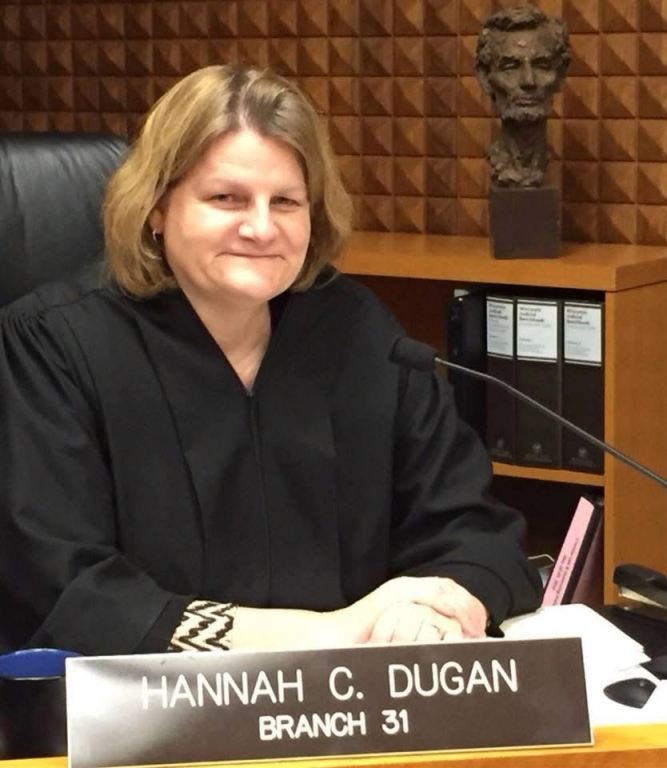All references can be found at United States v. Dugan.
In looking for a good image to use of the Judge, I found an article written in the third person by Hannah Dugan about how wonderful she is and all the good she has done, and that she will not answer any other questions.
She is lawyered up HARD. Which is the only correct thing to do.
The Armed Attorneys described using a lawyer for communications with authorities as “you can’t incriminate yourself when you use a lawyer.” The example the gave went something like:
FBI agent: Do you know Jim Jones?
You: No, I don’t know Jim Jones.
FBI: You’re under arrest for lying to a federal agent.
Why? They have video proof of you interacting with Jim Jones 9 months, 7 days, 14 hours ago at a party where he was introduced to you. Along with 50 other people.
FBI agent: Do you know Jim Jones?
You whisper in your lawyer’s ear: No.
Lawyer: My client disavows knowing Jim Jones.
You walk out free. Your lawyer’s words are hearsay, not an admission or statement by you.
IANAL.
Back to Dugan.
The Charges
18 U.S.C. § 1505 Obstructing or impeding a proceeding before a department or agency of the United States.
18 U.S.C. § 1071 Concealing an individual to prevent his discovery and arrest.
My reading of §1505 is that it wasn’t the judge physically obstructing or impeding, it was that the judge impeded the arrest which impeded the proceeding to get him out of the country. The act of concealing an individual to prevent his arrest is also impeding.
The Internet Lawyer Wanna Be (like I am) are focusing on only one part of the complaint. That seems to be because they can’t defend the other part.
Prosecutor: Mr. V. Illen then used his 9mm Glock to put two rounds into the victim’s head. Killing him.
Mr. Illen: I don’t own no Glock in 9mm, I used a .45. You got to set me free, you made a mistake.
It doesn’t work like that. A single error does not entirely invalidate a charge. There will be parts that people get wrong.
It is also the case that the word “or” has meaning in the law. Impeding is a word like “infringing”, it doesn’t take much to meet the requirements of impeding. It takes more to get to obstructing.
The Charging Document
ECF No 1 is the complaint in this case. The complaint is the charging document.
The Charging Document must contain the name of the accused, the specific crimes allegedly committed, the date, location, and relevant facts surrounding the alleged crime, and a clear and concise statement of the elements of the offense.
This document is what leads to an arrest warrant.
This complaint has a Judge’s signature on it. From this, I will guess that the magistrate judge found probable cause to issue the arrest warrant. In other words, I can’t find the actual arrest warrant.
What was the initiating event?
Eduardo Flores-Ruiz was charged with three counts of Battery, Domestic Abuse, Infliction of Physical Pain or Injury.
In other words, another wife beater.
When he was charged, his identification was transmitted to the federals. ICE Enforcement and Removal Operations were notified and did a records search.
That research found his Alien Registration File (“A-File”). Turns out that Flores-Ruiz was issued a Notice and Order of Expedited Removal on January 16, 2013. He was kicked out of the states into Mexico through the Nogales, Arizona, Port of Entry.
This happened under Obama.
This is an illegal alien that has an order for removal. Who has had all due process afforded him under the Obama DoJ. Who was removed from the country. He then crossed the border illegally, again.
An arrest warrant was issued for Flores-Ruiz by an immigration official.
This is the normal procedure. He had his due process in 2013.
The Feds went to the courthouse to arrest Flores-Ruiz. This is a common procedure.
The arrest warrant for Flores-Ruiz
The two types of warrants that we are used to are “arrest warrants” and “search warrants”. These fall into two different categories, judicial and administrative.
The right of the people to be secure in their persons, houses, papers, and effects, against unreasonable searches and seizures, shall not be violated, and no Warrants shall issue, but upon probable cause, supported by Oath or affirmation, and particularly describing the place to be searched, and the persons or things to be seized.
— Fourth Amendment
The Constitution does not tell us who issues warrants. This comes from case law.
The Supreme Court, through its case law, has established that it requires a judicial arrest warrant to enter a private location owned by the target of the warrant.
An arrest warrant for you allows the cops to enter your home to arrest you. They cannot search your home under that arrest warrant, but they can observe that which is in plain view.
They cannot enter your mother’s home to arrest you without consent, with just an arrest warrant.
With a judicial search warrant, they can enter the location identified by the search warrant without consent. The search warrant would list you as the thing they are searching for. Once they find you, they can arrest you with an adjacent arrest warrant.
With an administrative arrest warrant, the cops need consent to enter any private location, including your home. This is why you hear about agents waiting outside of courtrooms to affect an arrest. If all they have is an administrative warrant, they can’t legally enter the courtroom (private area) to arrest someone.
The arrest warrant for Flores-Ruiz was an administrative arrest warrant. After he was arrested, he would be able to contest the removal order. No need to send him through a court process.
This warrant does not require the Judge to do a damn thing to help Law Enforcement in arresting Flores-Ruiz.
…hive of scum and villainy…
Six ICE ERO members arrive to arrest Flores-Ruiz. ERO A, CBP A, FBI A and B, DEA A and B. They were in plains clothes.
ERO A and CBP A presented credentials to security guard, stated they were there to make an arrest. The guard passed them on to the Sheriff’s office. The Sheriff’s office requested that the arrest wait until after the completion of the scheduled hearing. This is standard. ERO A and CBP A agreed. They moved to the public hallway outside the courtroom.
Before ERO A and CBP A arrived, FBI A and FBI B had advised the courtroom deputy that they were there to arrest Flores-Ruiz. Again they agreed to wait until after his hearing before the judge.
The deputy notified a shift sergeant at the Sheriff’s Office.
A public defender came out and took pictures of some arrest team members. Fortunately, not all of them were together, so she missed at least one.
Flores-Ruiz arrived and was greeted by his attorney, and then the two entered the courtroom together.
The public defender spoke with the judge’s clerk. She told the clerk there ware ICE agents in the hallway. She described them to the clerk.
The clerk then informed Judge Dugan. Dugan became angry, left the bench to enter her chambers. Flores-Ruiz was in the gallery, waiting for his hearing.
Judge Dugan and another Judge came out into the public hallway to confront the known arrest team members. Dugan was visibly upset, angry, and confrontational. After determining that they were there for a court appearance, she ordered them out of the courthouse. They refused.
She then demanded to see a judicial warrant. They replied they had an administrative warrant. She said that it was no good. They argued that it was within the public areas of the courthouse.
She then ordered the arrest team to the chief judge’s office to talk to him.
The unidentified agents remained on post.
Judge Dugan then proceeded to look for more arrest team members before returning to her chambers.
The team members at the Chief Judge’s office learn that he is not in the building. They are then connected to him via phone.
(It appears that the Chief Judge had no problems with arrests being made in the courthouse, as long as they were done in public areas. It sounds like it was a cordial conversation)
The courtroom deputy reported to the other team members that Judge Dugan was attempting to expedite Flores-Ruiz’s hearing.
Flores-Ruiz was moved from the gallery to the Jury Box. The deputy reports that this is highly unusual.
Flores-Ruiz and his lawyer started to towards the public exit of the courtroom. Judge Dugan then ordered them to come with her. She took them to the “jury door” which leads to a nonpublic area of the courthouse.
Conclusion
This judge actively worked to obstruct and impede the arrest of a wife beating illegal alien. She actively hide him for agents seeking to arrest him.
She broke the law. The government now needs to prove that in a court of law.






